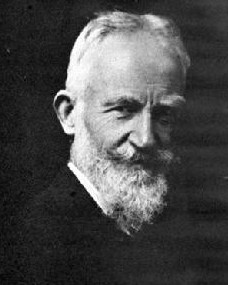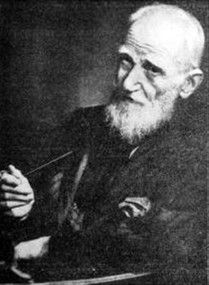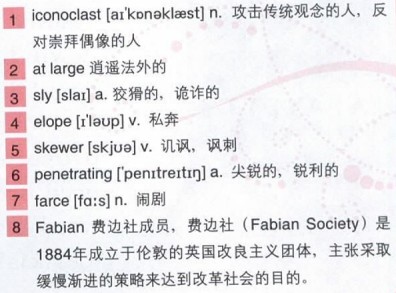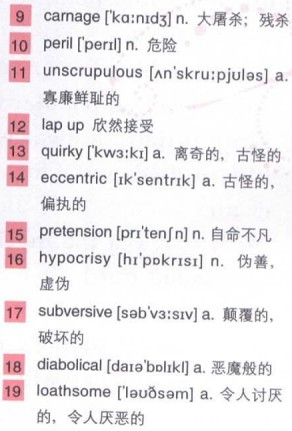The Nobel 1)Iconoclast—George Bernard Shaw
英式发音 适合精读
 爱尔兰作家萧伯纳——迄今为止惟一一位既曾获诺贝尔奖又曾赢得奥斯卡奖的作家。这位拒绝诺贝尔奖金的作家因出言不逊而得到的关注多于他的作品,但他却因此沾沾自喜。有人说他是优秀作家,有人说他是无赖,他总是旁若无人,我行我素。
爱尔兰作家萧伯纳——迄今为止惟一一位既曾获诺贝尔奖又曾赢得奥斯卡奖的作家。这位拒绝诺贝尔奖金的作家因出言不逊而得到的关注多于他的作品,但他却因此沾沾自喜。有人说他是优秀作家,有人说他是无赖,他总是旁若无人,我行我素。
“If I am sane, the rest of the world ought not to be 2)at large,” wrote George Bernard Shaw in 1939. The Irish author was famous for his wit and 3)sly humour and delighted in shaking up the social conservatism of early 20th century Britain.
Shaw’s mother 4)eloped with her voice teacher when Shaw was a teenager, and he later joined her in London, where he earned his living ghost-writing her lover’s music column for Hornet Magazine.
Shaw started to make a name for himself as an art, music and drama critic, but failed to get any of his novels published. His first play, Widowers’ Houses, was performed in 1892, and 63 plays, many of them among the best in the English language, followed. From Man and Superman to Androcles and the Lion, Shaw 5)skewered the sensibilities of the time with a 6)penetrating view of social inequalities and a finely honed satiric eye. He often used historic stories to highlight current issues, and by the time Pygmalion came to the British stage in 1914, he had a reputation for concealing political and social debate in witty 7)farces.
Of all his plays, Pygmalion had the biggest impact on popular culture. Shaw helped adapt it into an award-winning Hollywood film in 1938, and it formed the basis of Lerner and Loewe’s 1956 Broadway musical, My Fair Lady. But the musical version could not be created until after Shaw’s death, as the writer was so unhappy with Oscar Straus’ 1908 musical adaptation of one of his earlier plays, he forbade any further musical versions of his work.
“如果说我神智正常的话,世上其他人就应该被关起来。”萧伯纳在1939年如此写道。这位爱尔兰作家以俏皮风趣闻名,最爱批评20世纪初保守的英国社会。
萧伯纳少年时候,母亲与声乐老师私奔。他随后到伦敦与母亲团聚。为谋生计,他替母亲的情人代笔给《大黄蜂杂志》的音乐专栏写稿。
起初,萧伯纳靠评论艺术、音乐及戏剧获得一点名气,但他写的小说却无机会出版。他的第一部戏剧《鳏夫的房产》在1892年上演,后来又陆续写了63部剧,其中不少是英语文学中最优秀的作品。从《人与超人》到《安德鲁克里斯与狮子》,萧伯纳以敏锐的眼光洞悉社会各种不平等现象,针砭时弊。他的作品常常借古讽今。1914年,《卖花女》在英国舞台上获得好评。那个时候他已以妙趣横生的闹剧讽刺政治和社会议题而赢得了好名声。
在萧伯纳所有的戏剧作品里,《卖花女》对流行文化的影响最大。1938年,他协助将其改编成获奖的好莱坞电影,1956年由勒纳和洛伊改编的百老汇音乐剧《窈窕淑女》也以此片为蓝本。但该剧的音乐剧版在萧伯纳逝世后才面世。其起因是他对奥斯卡·斯特劳斯于1908年为他早期的一部作品改编的音乐剧极不满意。从此萧伯纳禁止他人把他的作品改编成音乐剧。
A passionate 8)Fabian, Shaw was committed to social justice and socialist ideals. Shaw was profoundly affected by the 9)carnage of World War I, and he was bitterly opposed to the war. In 1919 he released Heartbreak House, which warned of the 10)perils of trusting incompetent and 11)unscrupulous leaders with the reins of power.
In 1925, Shaw received the Nobel Prize for Literature in recognition of his outstanding body of work for the stage. He was in great demand as a speaker, and the press and public 12)lapped up his witticisms, 13)quirky political commentary and 14)eccentric humour. He was happy to give offense when required and was never more delighted than when he had the opportunity to deflate 15)pretension or highlight 16)hypocrisy. For the 1930’s, George Bernard Shaw was a household name across the English-speaking world.
By the 1930’s, George Bernard Shaw was revered as an elder statesman of literature and beloved by the British people. Even in his 80s, Shaw showed no signs of slowing down. In his memoirs, politician J.R. Kleins described him as a “brilliant speaker and provocative writer.” Shaw used both talents to put forward his revolutionary ideas for social change.
Shaw faced growing criticism for his socialist beliefs, but the iconoclast rejoiced that people considered his political aims “17)subversive and 18)diabolical.” He openly visited China and returned a firm supporter of Stalin, dismissing reports of famine and exploitation.
Children’s writer Edith Nesbitt summed Shaw up thus: “He is a clever writer and speaker, is the grossest flatterer I ever met, is horribly untrustworthy as he repeats everything he hears and does not always stick to the truth, and is very plain, like a long corpse with a dead white face, sandy, sleek hair and a 19)loathsome, small, straggly beard, and yet is one of the most fascinating men I ever met.”
 萧伯纳是一名充满热情的费边社成员,追求社会正义及社会主义理想。一战的大屠杀惨况对他影响很深,他是坚定不移的反战者。1919年,他发表了《伤心之家》,以此警告人们警惕那些既无能又无耻的领导人。
萧伯纳是一名充满热情的费边社成员,追求社会正义及社会主义理想。一战的大屠杀惨况对他影响很深,他是坚定不移的反战者。1919年,他发表了《伤心之家》,以此警告人们警惕那些既无能又无耻的领导人。
1925年,萧伯纳获颁诺贝尔文学奖,他出色的舞台作品受到了表彰。无数人邀请他演讲,报纸和民众都欣赏他的妙语、奇特的政治评论及独特的幽默感。在必要的时候,他不介意得罪人,更十分乐意揭穿别人的假面具,或者突显他们的虚伪。到了30年代,他在英语世界已经是一个家喻户晓的人物了。
到了上世纪30年代,萧伯纳已贵为大文豪,深受英国人的爱戴。他年过80仍不减忙碌。政客克莱恩斯在回忆录中形容他“口才出众,文笔耐人寻味”。而萧伯纳则两者并用鼓吹其改革社会的理念。
萧伯纳的社会主义信念日益受到抨击。旁人视其政治目标具颠覆性,穷凶极恶,但标新立异的他反而为之得意不已。他公开访问中国,回国后坚决支持斯大林,并驳斥了关于饥荒和剥削等报道。
儿童作家伊迪丝·尼斯比特为萧伯纳如此总结:“他是聪明的作者和演说者,他是我认识的最厚颜无耻的奉承者;他完全不可靠,因为入耳的话无不说出去,而且不一定句句如实。他寒素如一脸死白的长条死尸,长着一头光滑的浅棕色头发和一把恼人的蓬松小胡子,却偏又是一个难得一遇、引人入胜的人物。”
翻译:丁一


